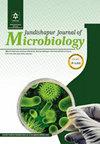Associations Between Fusobacterium nucleatum and msh2, mlh1, and msh6 Gene Expression in Colorectal Cancer
IF 0.5
4区 医学
Q4 MICROBIOLOGY
引用次数: 0
Abstract
Background: Colorectal cancer (CRC) is a major global health concern, and the link with Fusobacterium nucleatum has received considerable attention. Objectives: This study aimed to explore the prevalence of F. nucleatum and to assess the expression of the msh2, mlh1, and msh6 genes in CRC patients compared to a control group using real-time PCR. Methods: Forty CRC patients and twenty individuals from a control group participated in this study. Gastroenterologists collected biopsy specimens from which DNA and RNA were extracted using a specialized tissue extraction kit. Complementary DNA (cDNA) was then synthesized. Real-time PCR was employed to evaluate the expression levels of the msh2, mlh1, and msh6 genes and the presence of the F. nucleatum-specific 16srRNA gene to determine the relative prevalence of this bacterium in each group. Results: Results indicated a higher prevalence of the F. nucleatum-specific 16srRNA gene in CRC patients than in the control group. Additionally, expression levels of the msh2, mlh1, and msh6 genes were significantly higher in the cancer group, suggesting their role in CRC pathogenesis. The distribution of F. nucleatum was particularly high in the sigmoid and rectum areas of the colon. Conclusions: This study underscores the significance of F. nucleatum in CRC and provides insights into its association with altered gene expression patterns. Understanding the prevalence of F. nucleatum and its impact on msh2, mlh1, and msh6 genes may aid in developing improved diagnostic and therapeutic strategies for CRC. Further research is necessary to elucidate these relationships more comprehensively.大肠癌中核分枝杆菌与 msh2、mlh1 和 msh6 基因表达的关系
背景:结肠直肠癌(CRC)是全球关注的一大健康问题,而它与核酸镰刀菌之间的联系受到了广泛关注。研究目的本研究旨在探讨核酸镰刀菌的流行情况,并使用实时 PCR 评估 CRC 患者与对照组相比 msh2、mlh1 和 msh6 基因的表达情况。研究方法四十名 CRC 患者和二十名对照组患者参与了这项研究。消化科医生收集活检标本,使用专用组织提取试剂盒提取其中的 DNA 和 RNA。然后合成互补 DNA(cDNA)。采用实时 PCR 评估 msh2、mlh1 和 msh6 基因的表达水平,以及核酸痢疾杆菌特异性 16srRNA 基因的存在情况,以确定该细菌在各组中的相对流行率。结果结果表明,与对照组相比,CRC 患者中核不动杆菌特异性 16srRNA 基因的流行率更高。此外,癌症组中 msh2、mlh1 和 msh6 基因的表达水平明显较高,表明它们在 CRC 发病机制中的作用。F. nucleatum在结肠乙状结肠和直肠区域的分布尤为广泛。结论:本研究强调了 F. nucleatum 在 CRC 中的重要性,并深入探讨了 F. nucleatum 与基因表达模式改变之间的关联。了解 F. nucleatum 的流行程度及其对 msh2、mlh1 和 msh6 基因的影响有助于开发出更好的 CRC 诊断和治疗策略。要更全面地阐明这些关系,还需要进一步的研究。
本文章由计算机程序翻译,如有差异,请以英文原文为准。
求助全文
约1分钟内获得全文
求助全文
来源期刊

Jundishapur Journal of Microbiology
MICROBIOLOGY-
CiteScore
1.30
自引率
0.00%
发文量
56
审稿时长
6-12 weeks
期刊介绍:
Jundishapur Journal of Microbiology, (JJM) is the official scientific Monthly publication of Ahvaz Jundishapur University of Medical Sciences. JJM is dedicated to the publication of manuscripts on topics concerning all aspects of microbiology. The topics include medical, veterinary and environmental microbiology, molecular investigations and infectious diseases. Aspects of immunology and epidemiology of infectious diseases are also considered.
文献相关原料
| 公司名称 | 产品信息 | 采购帮参考价格 |
|---|
 求助内容:
求助内容: 应助结果提醒方式:
应助结果提醒方式:


